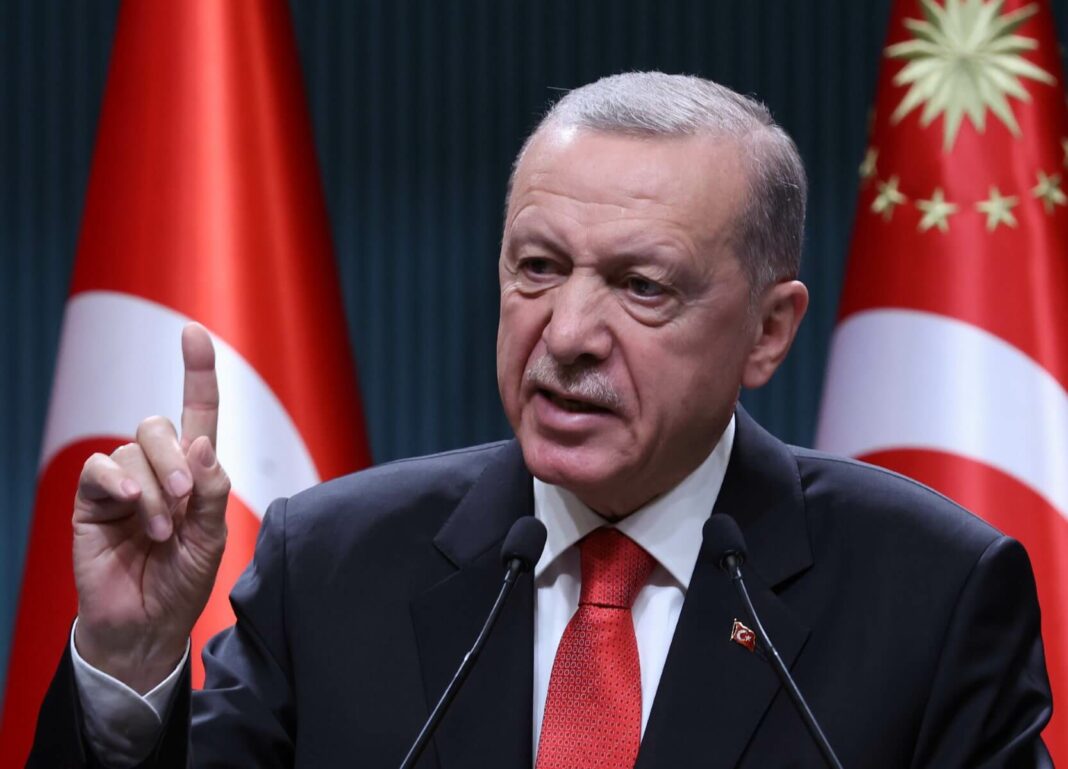Turkish President Recep Tayyip Erdoğan is using a judicial crisis involving two high courts due to conflicting rulings on a jailed lawmaker to press ahead with plans to limit the power of the Constitutional Court after voicing explicit support for the Supreme Court of Appeals.
The unprecedented crisis between the top courts erupted on Wednesday when the Supreme Court of Appeals refused not only to comply with the top court’s decision on jailed lawmaker Can Atalay but also filed criminal complaints against the judges of the Constitutional Court due to their ruling for the MP, which found rights violations in his incarceration.
“We will prevent the emergence of such a debate again by taking all measures including legislation or constitutional amendments, if necessary,“ Erdoğan said at an event at the presidential palace in Ankara on Friday.
He said the decisions of the courts can be debated and that no state organ including the high courts are immune to criticism or not accountable for their actions.
“The proper place for the settlement of the sphere of authority debate between two judicial bodies is the constitution,” Erdoğan said, lamenting that Turkey’s current laws and constitution are insufficient to address the issue.
In an earlier statement, the president broke his two-day silence on the judicial crisis and sided with the Supreme Court of Appeals while targeting the judges of the Constitutional Court for making mistakes.
“At this point, unfortunately, the Constitutional Court has made many mistakes, one after another. This saddens us,” he told reporters during a return flight from a trip to Uzbekistan.
He said the appeals court’s request for prosecutors to investigate the Constitutional Court judges “cannot be discarded or pushed aside.”
The appeals court told the Constitutional Court that it, too, is a high court and that its rulings have to be respected, according to Erdoğan.
While the appeals court’s move sparked an angry response from the opposition, there were mixed reactions from within Erdoğan’s ruling Justice and Development Party (AKP).
He said those in his party supporting the Constitutional Court’s stance are making a mistake.
On Friday the president also denied taking sides with either of the courts, saying he is an “arbitrator” in this case rather than a “side.”
He said as the head of state, he has a responsibility to make sure that state organs work in harmony with each other and that the crisis between the courts has once again raised the need for a new constitution.
Erdoğan and his AKP have been talking about the need to replace Turkey’s current constitution for years. Discussions concerning the need for a new constitution again came to the public agenda after Erdoğan’s victory in the presidential election in May.
Atalay, who is at the center of the crisis, was elected to parliament from the Workers Party of Turkey (TİP) in May while serving a sentence for his alleged role in the anti-government Gezi Park protests of 2013. Jailed businessman Osman Kavala was the most prominent defendant in the same trial and was given a life sentence.
Since Atalay was not released from prison despite acquiring parliamentary immunity, he applied to the Constitutional Court in July claiming that he has been subjected to several rights violations due to his continued incarceration.
The top court ruled last month that Turkey violated Article 67 of the Turkish Constitution, which concerns one’s right to elect, stand for election and engage in political activities, as well as Article 19, which concerns the right to liberty and security.
Atalay was not released from prison despite the top court’s decision, with a lower court referring the case to the Supreme Court of Appeals, which upheld his 18-year conviction in September.
In a move that triggered a significant backlash, protests and accusations of a judicial coup, the Supreme Court of Appeals made its controversial decision against the release of the lawmaker in addition to filing criminal complaints against top court judges.
Although this is the first time that the judges of the Constitutional Court are facing criminal complaints due to a ruling, they are frequently subjected to criticism and sometimes attacks from Erdoğan and his far-right ally Devlet Bahçeli, due to their decisions on politically motivated trials.
For instance, Bahçeli called for the closure of the top court on many occasions for failing to conclude a closure case against a pro-Kurdish party that he accuses of having links to a militant group.
In some cases, lower courts fail to abide by Constitutional Court decisions, which raises concerns further about the independence of the judiciary.
The Turkish judiciary faces widespread criticism for its perceived lack of independence. Critics accuse Erdoğan of exerting control over the judiciary and establishing one-man rule in the country, particularly after a coup attempt in 2016, following which he launched a massive crackdown on non-loyalist citizens and the country’s subsequent transition to a presidential system of governance, which granted him vast powers.
Many say there is no longer a separation of powers in the country and that members of the judiciary are under the absolute control of the government and cannot make judgments based on law.
In a development that validated the critics, Turkey was ranked 117th among 142 countries in the rule of law index published by the World Justice Project (WJP) in October, dropping one rank in comparison to last year.
